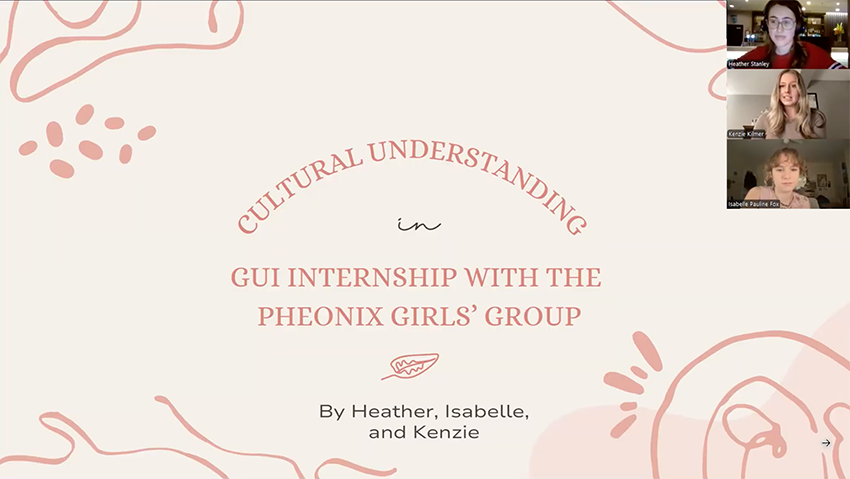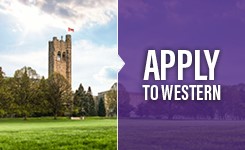Third Year

Third-year students give a group presentation for Intro to Professional and Community Practices
HOW YEAR THREE COURSE OFFERINGS WORK IN SASAH:
In Year Three you are required to take 2.0 courses (3380Y, 3390F/G-3393F/G) for your Arts and Humanities major. Each student is required to take SASAH 3380Y regardless if they are away on exchange or attending classes at Western. The remaining 1.5 courses (3390F/G – 3393F/G) will be cross listed with other departments in the faculty of Arts and Humanities. We’ve done this on purpose as we don’t want to restrict your course choices in Year Three, at a time when we want to encourage you to develop your own research interests. You are welcome to take an upper-level (Year Three or Four) course in your field of choice to fulfill the remaining credits, instead of enrolling in the courses offered by SASAH. Western also allows students to double count up to 1.0 courses between their modules, provided students receive permission from both units.
The courses offered in Year Three are always cross-listed with the Research Fellow’s home department. However, this does not mean you need to fulfill that department’s prerequisite to take this course. In all cases we ask the department to waive this restriction. These courses are designed to reach an interdisciplinary audience – i.e. you.
Finally, we’ve structured the Year Three courses this way so as to get students out and integrated into learning experiences across campus, in other departments, etc. Also, as some students choose to head abroad in Year Three, the SASAH cohort is smaller for that year.
Year Three course prerequisites: SASAH 2200E or the former ARTHUM 2220E, SASAH 2220F/G or the former ARTHUM 2220F/G or SASAH 2230F/G or the former ARTHUM 2230F/G, and SASAH 2240F/G or the former ARTHUM 2240F/G
Courses for 2025-2026
SASAH 3380Y: Introduction to Professional and Community Practices
Required course for all year three students
This online course introduces students to the critical and research skills and practical tools required to 1) engage in experiential learning; 2) comport oneself in a professional manner in preparation for the job market and related contexts; 3) plan a community-based, fourth-year group project or undertake a project with a community partner; and 4) plan an individual research or creative fourth-year project.
As part of our support for students as they prepare to enter the working world, the SASAH program emphasizes Experiential Learning (EL) through both integrated projects and required courses. In its first half, this course introduces students to the tools and skills required to engage successfully in EL and develop professionalism. In its second half, this course facilitates the student's research and advanced planning for the individual and group projects they will undertake in their fourth-year capstone seminar.
SASAH 3390F: Topics in the History of Political and Legal Philosophy [cross-listed with Philosophy 3810F]
TBA
SASAH 3390G: Banned and Challenged Books [cross-listed with English 3724F]
Students will read a variety of banned, challenged, and controversial books for children and young adults. In focusing on such books, we consider the impetus behind challenging books, what it tells us about a particular historical moment, and what it tells us about literature in general.
SASAH 3391F: Lessons by Design (Asynchronous) [cross-listed with Art History 3676F]
This course examines through a number of key texts differing aspects of design ranging from the technical to the theoretical, from the practical to the utopian, from typography and fashion to design thinking in business. It offers a broad survey of the contemporary design landscape, aimed at showing how pervasive design is in our everyday lives.
SASAH 3392G: Introduction to Queer Theory [cross-listed with GSWS 3173G]
What is queer theory, where did it come from, how is it changing? Examining key foundational texts in queer theory, the contexts for its emergence, and debates over its comtemporary usefulness and direction, students in this course will trace the development of queer theory and investigate its current applications.
SASAH 3393F: Athenian Democracy in Crisis [cross-listed with Classical Studies 3636F]
This course uses the student-centered, experiential Reacting to the Past pedagogy to explore the social and political history of Athens in 403 BC. In an immersive role-playing game students research and bring to life known historical figures and debate, as members of rival political factions, the future of Athenian democracy.
For their Year Three requirements SASAH students can also qualify to apply for a limited number of spaces in Special Topics courses offered outside of the School. Present and past courses include:
Classical Studies 4580F/G: Vindolanda Field School:
The Vindolanda Field School is an intense and very rewarding five-week study abroad experience for Western students in any discipline. A primary goal of the field school is for students to gain an appreciation for combining historical and archaeological material to further our understanding of past cultures, especially those effected by conquest and imperialism in the Roman provinces. The focus of the archaeological component is at the site of Vindolanda, an important Roman military fort along Hadrian’s Wall, and includes daily participation in all aspects of the project: excavation, survey of buildings and landscape, finds processing (ceramic and bone washing, environmental sampling), and data recording (stratigraphic context sheets, photography, section/plan drawing, etc.). An in-depth understanding of the archaeology at Vindolanda will be supplemented with trips to other sites and visits to active excavations around the north of Britain. The historical component focuses on the history of the Roman period in Britain with particular emphasis on the northern frontier and the role of soldiers and civilians within the province. The historical aspect of the course is achieved through evening lectures, field trips, on-site discussions and student presentations.
Vindolanda Program Information
Vindolanda Archaeological Site Information
Theatre Studies 3900G: Destination Theatre
Students will have the opportunity to develop their drama education more deeply through the experience of theatre abroad, in London, England. Attendance at live performances will be complemented with daily lectures, workshops and seminars hosted by artists and scholars from the University of London, the Royal Shakespeare Company, and the Shakespeare Birthplace Trust. In addition, students will experience tours of theatres, archives, and do a theatre-themed walking tour of central London.
Destination Theatre Program Information





